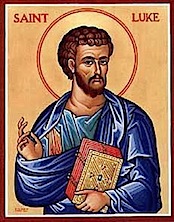Surprised by Acts

I've been in the book of Acts lately and there have been some surprises—those “ah ha” moments when you see something for the first time that was always there. Here’s a few . . .
Acts is the second half of one story. Luke wrote his Gospel to tell the story of what Jesus began to do and teach. He wrote Acts to tell the story of what Jesus continued to do through his disciples, by the power of the Holy Spirit. Jesus is alive. He is on centre stage.
Acts is built around six summary statements that tell of the progress of the word of God. The word of God is an unstoppable force. It grows, it multiplies, it spreads. What does that look like?—new disciples and new churches in new places.
Here’s a relief, Acts teaches that this mission is not about us. Jesus didn’t bequeath his principles and ideals to his followers and leave them to carry out the task. If that is all he had done, Peter and Andrew would have spent the rest of their lives building up a prosperous fishing business in Galilee. The Resurrection and the coming of the Holy Spirit means we don’t inherit the ministry of Jesus, he continues his ministry through us.
God is on the move, and so are his people. The story of Acts is the story of the missionary expansion of the Christian faith. When the disciples settle down the Spirit intervenes to move them on.
Peter was enjoying a snooze before lunch when God intervenes to send him to the Gentiles. They receive the gospel, the Spirit falls and Peter leaves after just a few days. How "incarnational" is that? Who is going to take responsibility for the new church and the spread of the gospel in Caesarea? Probably Cornelius and the other new believers. At least he knew New Testament Greek, even if the New Testament hadn’t been written.
Here's a verse from Acts to claim: "Through many tribulations you will enter the kingdom of God.” Acts is full of trouble—defeat, persecution, suffering, disunity, martyrdom, danger, imprisonment. Yet somehow the word of God continues to grow and multiply. There’s a cycle—the word spreads, there’s trouble, then God uses the trouble to spread his word even further. Then there’s more trouble.
In Acts God calls the shots. He raises Jesus from the dead. He sends his Spirit into the church. He closes and opens doors for the advancement of the gospel. He allows James and Stephen to die and he sends an angel to release Peter from jail. He drops Saul into the dust on the Damascus road. We are left in no doubt—God is at work. Despite all the obstacles, nothing can stop the relentless spread of the gospel.
Acts never ends. Acts begins with Jesus promise and command to his disciples, “You will receive power when the Holy Spirit comes on you; and you will be my witnesses in Jerusalem, and in all Judea and Samaria, and to the ends of the earth.”
The story ends with Paul preaching in Rome, but Rome is not the end. Luke’s readers would have thought it ridiculous to view the center of the empire as the “ends of the earth.”
The second half of the book is all about Paul. Yet Luke doesn't bother to tell us what happens to Paul in the end. That's because it's not about Paul, its about God's mission through Paul and others. So Luke ends chapter 28 with: "To be continued". The word will continue to spread to the ends of the earth through God’s people empowered by the Holy Spirit. That's where we come in.
The greatest surprise of all is how far removed from the book of Acts is our understanding and practice of making disciples, planting churches, the spreading of the gospel, and advancing the kingdom of God. I guess that’s why Luke wrote Acts.
